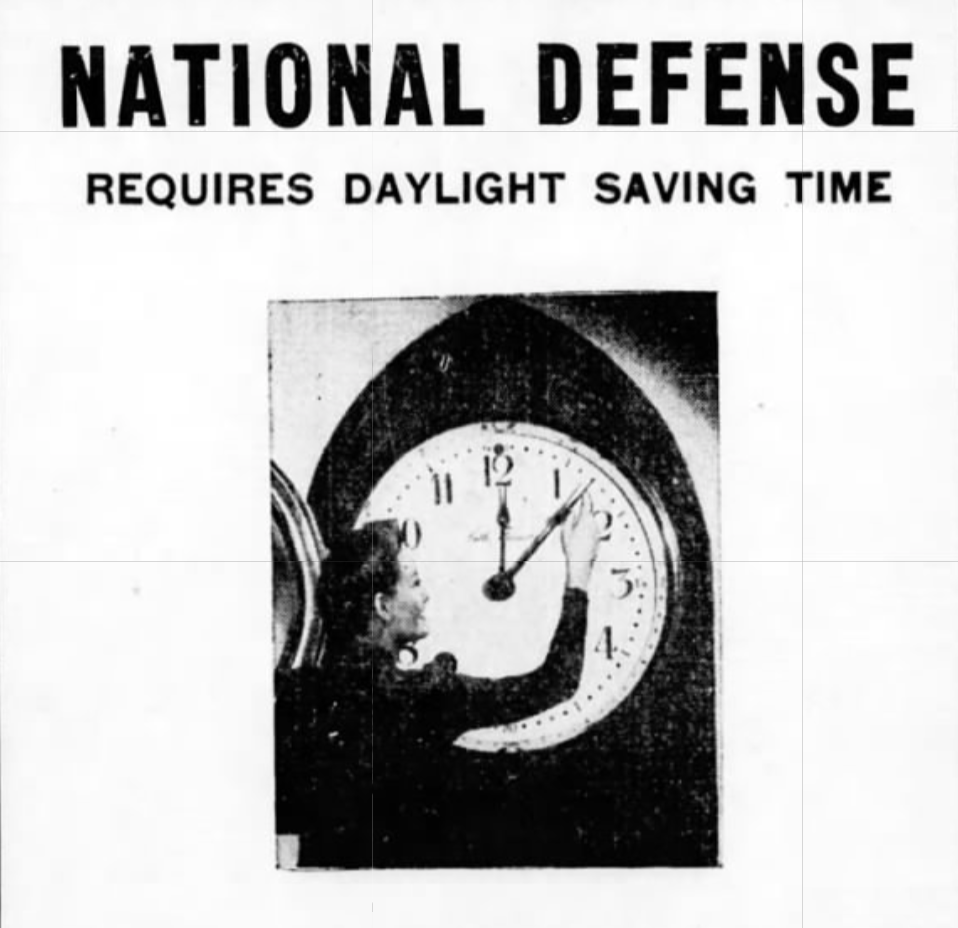“Clocks all over Asheville, Western North Carolina, and the state will be turned up an hour at midnight tonight, or tomorrow morning, as this state goes on daylight saving time for the remainder of the summer, as a national defense measure,” The Asheville Citizen reported in its July 27, 1941, edition. “It is a simple matter of moving the clock up an hour.”
Yet in a separate editorial in that same day’s issue, the paper made clear the potential for plenty to go wrong with the new initiative:
“If a Sunday midnight wedding is planned, and the groom fails to show up —
If the roosters crow when they aren’t supposed to —
If you get to work an hour late Monday morning —
If you miss a favorite radio program —
Or — to turn a pleasant side of the picture — if a long-awaited letter is brought by the postman an hour earlier than it was expected —
It’s all due to the fact that you, or somebody else didn’t (or did) turn the clock up an hour at midnight Sunday. (Better turn it up at bedtime, just to be safe, if your bedtime is earlier than midnight!)”
At the time, America had yet to enter the Second World War. Still, President Franklin Delano Roosevelt was already pushing to conserve the nation’s energy supply, asking Congress to empower him to issue executive orders “fixing new time standards in some areas [such as Asheville] and leaving others unchanged” in the name of national defense, The Asheville Citizen reported on July 16.
“I wonder what the president is going to want to control next,” Sen. Gerald Nye of North Dakota is quoted as saying in the article. “Daylight saving is nothing but a policy of fooling ourselves. The simplest way to gain an hour of daylight is to get up an hour earlier in the morning.”
Local residents seemed less opposed to the measure.
“Nobody much, save perhaps the clock-setter, seems to have been incommoded by Asheville’s shift to Daylight Saving Time,” an editorial read in the July 29, 1941, edition of The Asheville Citizen.
There were exceptions, of course, as the paper went on to explain:
“Commuters stepped on the gas a bit, forgetful of rationing appeals, as they sped to work an hour earlier by the sun but a bit tardy by the clock. The farmer in all probability followed his customary routine, for cows and chickens, not at all clockwise, needed his attention at the usual time. The city dweller groaned a bit as he hit the floor an hour ahead of time, but he took it in good stride.”
Because the hour shift was not adopted across the nation, the railroads, bus lines and airlines remained in Eastern Standard Time, which subsequent reports did note “resulted in some confusion” for local riders.
But with summer’s end came the return to standard time. “Just when a good part of the folks have become used to getting up on ‘fast time,’ along comes the ‘guvment’ to change around to ‘slow time’ again,” The Asheville Citizen jokingly lamented in its Sept. 25, 1941, edition.
“This means that when the folks go to bed Saturday night they will set their clocks back an hour, and thus will gain one extra hour in bed fore the bong-bong of the alarm clock arouses them again.”
The experiment returned once the U.S. entered World War II, with time advancing one hour on Jan. 20, 1942. The new “war time” remained in effect until the war’s conclusion.
“There has been increasing opposition to the ‘fast time,’ from the rural areas principally” an AP article published in The Asheville Citizen reported on Sept. 12, 1945. “Farmers have flooded the mail of their congressmen with complaints that the system worked a hardship on them.”
Two decades later, in 1966, daylight saving time became law with the passage of the 1966 Uniform Time Act.
Editor’s note: Peculiarities of spelling and punctuation are preserved from the original document.



Before you comment
The comments section is here to provide a platform for civil dialogue on the issues we face together as a local community. Xpress is committed to offering this platform for all voices, but when the tone of the discussion gets nasty or strays off topic, we believe many people choose not to participate. Xpress editors are determined to moderate comments to ensure a constructive interchange is maintained. All comments judged not to be in keeping with the spirit of civil discourse will be removed and repeat violators will be banned. See here for our terms of service. Thank you for being part of this effort to promote respectful discussion.